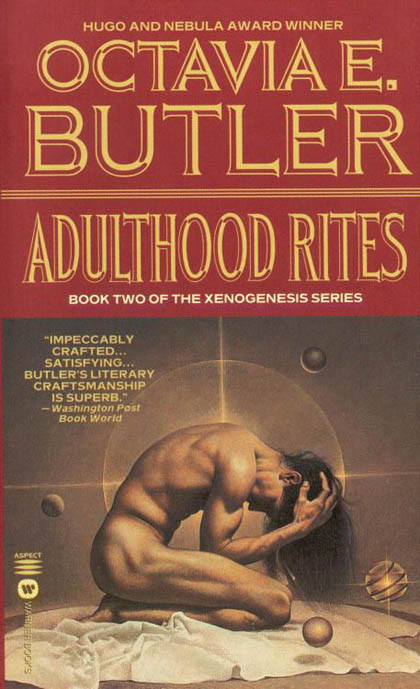As the title of Octavia Butler’s Adulthood Rites indicates, this novel is part coming-of-age story. Yet like its predecessor Dawn, it occurs in the context of colonization, complete with a tangled web of desire, xenophobia and hybridity. (I recently wrote about Dawn, the first volume of Lilith’s Brood, the trilogy formerly known as Xenogenesis.) Dawn is seen through the eyes of Lilith, a human woman faced with impossible decisions when the alien Oankali colonize what’s left of a post-apocalyptic human race. The sequel is the story of Akin, Lilith’s half-human, half-Oankali son, born thirty years after the first novel takes place.
Life isn’t easy when you have five parents representing three genders and two species. Akin is a human-Oankali “construct,” belonging culturally and physiologically to neither group and yet to both. He is precocious, fully verbal, and prodigiously intelligent. He lives in one of Earth’s “trade villages.” In these communities humans were successfully coerced into participating in the Oankali interbreeding program, building mixed families in which they experience both love for and resentment toward their alien mates and hybrid children.
Growing up in a mixed-species village with a deeply embedded power imbalance makes reasonable sense for Akin until he is captured by a group of human resisters. The resisters have refused to join with the Oankali, but are allowed to live in their own communities. The catch, of course, is that the Oankali have sterilized them, so they resort to abducting construct children who look “normal” (sans Oankali tentacles), which Akin does. His captors sell him to a small resister town called Phoenix. As Lilith was imprisoned by the Oankali, now Akin must suffer at the hands of the humans. Yet like his mother, he finds the other both horrifying and compelling, resists his imprisonment yet learns from it, and comes to love some of his captors. He begins to connect with his human side, and to see the value in preserving human culture.
The Oankali abandon Akin to Phoenix for a year so he can learn human ways and later advise the Oankali about handling the resisters. They bring Akin back to the trade village, but he spends his youth traveling to resister villages and building relationships with humans. Balanced between both worlds, he is in a unique position to advocate for the resisters to have their fertility restored and to be sent to a terraformed Mars to form their own civilization. The Oankali have reserved part of their population to continue independently, without engaging in genetic trade with the humans. Why shouldn’t the humans have the same right?
As with Dawn, Butler depicts both species ambivalently. Both groups love and yet equally use a child for their own purposes, ignoring the traumatic effects. The constructs and Oankali patronize and underestimate the humans, just as the humans displace thousands of years of racism onto the Oankali (even inventing fun new epithets like “worms” for their tentacled alien overlords). The human intolerance of difference and anxiety about managing bodies and maintaining homogeneity is most clear in their threat to amputate tentacles from two construct sisters they steal. The girls narrowly escape a cosmetic surgery experience likened to having one’s eyes cut out.
Yet both humans and Oankali prove capable of growth and understanding. The Oankali are convinced to give humans a second chance. When Akin is finally put in charge of starting the terraforming and human colonization of Mars, he undergoes a pubescent metamorphosis that masks all his physical human characteristics, so the humans’ biggest advocate now appears utterly alien. Yet, as Akin learned to tolerate and eventually admire human difference by living among the humans, so the humans accept him in his new form. Difference, it seems, can be as much grounds for affinity and alliance as it can for antagonism. Transformations are both external and internal.
Butler’s characters often intone that biology is destiny. The human biological Contradiction between intelligence and hierarchical tendencies makes them self-destructive and oddly seductive to the Oankali. Akin insists that humanity can breed out these violent tendencies. Yet it is Akin’s experience living in a culturally human setting that convinces him humans can change, and makes him an advocate for their rights. Even his fellow constructs are skeptical that humans should be allowed to live on their own, considering what a nice job they did wiping themselves out with nuclear bombs the first time around. When Akin is removed from settings dominated by Oankali culture and thought he quickly sees that, while human danger is real, so is Oankali manipulation and domination. The novel turns not on biological determinism, but on the characters’ capacity to learn and change with and often in resistance to their biology. They compromise. The resisters learn to accept difference and unlikely alliance, the constructs come to a better understanding of their dual nature, and the Oankali admit they may have been wrong to deny humans their own future. Akin acts as a mediator between cultures he learns to be both hopelessly flawed and worthy of survival.
Erika Nelson is re-reading the Octavia Butler canon for her M.A. thesis. She spends most days buried under piles of SF criticism and theory, alternately ecstatic and cursing God.










